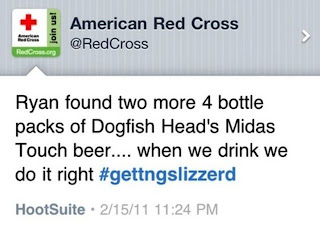I should begin by noting how badly I wanted to like Tunerfish. It was a pretty innovative idea that was a combination of two of my favorite things, social media and television. The website has the glitz and glamour of a successful and fun social media website, but it is missing one very crucial aspect, the social part. Becoming a part of the established community has been difficult.
Other social networking communities I am currently a part of were almost effortlessly established. I haven't found that ease with Tunerfish. I do as I'm told and answer the simple "What are you watching?" question and it seems like I'm having a conversation with myself. I have yet to understand how becoming a part of the community on Tunerfish is possible.
Tunerfish attempts to establish a sense of community by recommending people to for their users to follow. It is my understanding that the follower recommendations are based off users with similar watching habits. If I commonly post that I am watching, Modern Family, The Office, and 30Rock, then Tunerfish will suggest users who watch the same shows. While it is neat to see what you have in common with people, it is a useless feature because there is very little user-to-user interaction on the site.
When I was first exploring the site I thought Tunerfish would catch on because it would be a new and interesting way to learn about new television. I thought I would gain insight on emerging shows. However, if the only people I am following like all the same shows as me, then what do I learn? The answer is nothing. Tunerfish so badly needs to improve interaction among users on the site. It has so much potential to be a television-swapping site, but doesn’t even attempt to do that.
I also do not understand the awards feature of Tunerfish. I currently have a Guppy Award and an Oscar Award. The Guppy award was completely a pity, thanks-for-signing-up, type of deal. The Oscar award I'm pretty sure is just a result of posting that I was indeed watching the Oscars. Apparently there are 121 possible awards to win. But what do they even mean? If I have more awards will I connect with more users? What will earn me awards? None of this is clear. The awards component of this site seems useless and just clutters the site.
One part of this project was to explore emerging social networking sites and follow them as they gain momentum from unheard of to viral. As I learn more about Tunerfish it seems that their online presences is, if anything at a stand still. Unlike Quora or Hunch, Tunerfish does not even have a Wikipedia page. As a hopeful social media site, creating a Wikipedia page should have been an initial priority. The same viral energy that surrounds both Quora and Hunch is not present with Tunerfish.
While I think overall the Tunerfish website is precious, I just don't see much of a future for a site like this. Once you post what you are watching, then what? There really isn't much offered on the site to keep you their longer than the 2 seconds it takes to post about what you are watching. It doesn't have that addictive pull that Twitter or Quora have.
Maybe there are components I am missing out on that make Tunerfish a site worth noting. My logic tells me however, that if someone fairly savvy in the social media department fails to understand all aspects of a site after 2 months of playing with it, then your site isn't as user friendly as it needs to be. Maybe that's the issue. Either way, at this point in my exploration, I don't see Tunerfish causing any sort of ruckus in the social media world.
While I think overall the Tunerfish website is precious, I just don't see much of a future for a site like this. Once you post what you are watching, then what? There really isn't much offered on the site to keep you their longer than the 2 seconds it takes to post about what you are watching. It doesn't have that addictive pull that Twitter or Quora have.
Maybe there are components I am missing out on that make Tunerfish a site worth noting. My logic tells me however, that if someone fairly savvy in the social media department fails to understand all aspects of a site after 2 months of playing with it, then your site isn't as user friendly as it needs to be. Maybe that's the issue. Either way, at this point in my exploration, I don't see Tunerfish causing any sort of ruckus in the social media world.







